 I haven’t posted about Covid19 epidemic before – I leave the medical stuff to the experts. As an ordinary person, a ‘civilian’, I can see it’s an unknown killer that can sneak up on you for up to 14 days before it shows itself and against which we have no known cure. Effects vary from light flu-like symptoms to death. This makes it massively unpredictable and is ant the root of most anxiety. I haven’t posted about Covid19 epidemic before – I leave the medical stuff to the experts. As an ordinary person, a ‘civilian’, I can see it’s an unknown killer that can sneak up on you for up to 14 days before it shows itself and against which we have no known cure. Effects vary from light flu-like symptoms to death. This makes it massively unpredictable and is ant the root of most anxiety.
We’re just finishing our second week of ‘confinement to barracks’ here in France which is an effort to create a medical firebreak in the spread of the disease. Here at Château Morton we’ve settled into a routine not much different from the usual one, but one coated with a hefty layer of wariness.
At the time of writing…
What we can’t do:
- go out to a restaurant (which have all been closed since 15 March) or most shops
- have your hair done (not the end of the world)
- meet up with friends for coffee or dinner at their or our house
- take long journeys
- go to association meetings, the library or education courses
- make non-essential visits to older relatives (we are the oldest in our family, so not a problem)
- otherwise congregate
 Yes, we have loo rolls in the supermarket! What we can do
- go to the local supermarket for food shopping – all marked up with one entrance and exit – red and white tape abounds
- take a walk for up to an hour – no hardship in our rural part of France – with a dog if you have one (we don’t), but no further than a kilometre
- go to medical appointments/collect prescriptions, etc.
- work from home – no change there for this writer
- dig up weeds, mow lawn, carry out those DIY projects that kept being ignored
- read – I am blasting my Amazon Kindle account
- interact via Skype and Zoom and, of course, by Facebook and Twitter
People can go to work within the legal restrictions, i.e. it must be essential and where you will be a minimum distance of a metre apart. If you’re called to go to court, you’re allowed to travel for that! And there’s that glorious French catch-all:
Participation à des missions d’intérêt général sur demande de l’autorité administrative.
Almost untranslatable across the cultural barrier, but generally meaning “Participating in activities for the general good at the request of the appropriate administrative authority.”
 Armed with our permits for our daily walk Paperchase
And being France, you have to carry a piece of paper and your identity card even if you go out for a walk in the back end of nowhere! You self-certify each time using an official Ministry of the Interior form. But woe betide you if the gendarmes or police check you and you haven’t bothered to complete one and bring it with you – you’re in for a 135 euro fine rising by large steps if you don’t pay it within a certain time.
So how do we feel about all this?
Yes, we are anxious; we’d be mad not to be. It’s also boring, but not a hardship. For others, it means being cooped up with possibly fractious children in a small house. For some – mercifully few – it’s downright dangerous if there is a history of domestic abuse.
Children have been sent home with schoolwork to complete and the Ministry of Education is streaming classes. Children all do the same lesson at the same time all over France, so they follow the same syllabus. Teachers are delivering tutorials online either from home or from schools acting as centres for keyworkers’ children. Public broadcasters are supporting this with complimentary material.
Economically, it’s hard for small traders and artisans. However, when it initiated the lockdown the government implemented a minimum wage based package for them plus they have undertaken to pay 80% of employees’ wages. All sorts of taxes, and social charges have been suspended – I can’t put it all in here! It’s going to be rough, but we will get through it.
 Like everywhere else, there is a shortage of protective materials and gel, the health workers are working their socks off, retired medical and nursing staff have been recalled and the scientists are working flat out on remedies, tests and vaccinations. Like everywhere else, there is a shortage of protective materials and gel, the health workers are working their socks off, retired medical and nursing staff have been recalled and the scientists are working flat out on remedies, tests and vaccinations.
Currently, we have just under 33,000 confirmed cases and nearly 2000 deaths in France. (Update: 93,500 and 8,024 respectively on 6 April) And the peak is expected to be next week. Although very anxious about the virus, the public is backing President Macron’s measures.
My hands are dry and flaking and resemble something unearthed at midnight in a zombie movie; but they’ve never been so clean. I have a pair of stretch decorating gloves for when I go out to the supermarket – not very keen on touching the trolley or card payment keypad. Needless to say, the gloves get thoroughly cleaned when I come back.
If we have to do another two weeks, or three, then so be it.
UPDATE: the French Government has just announced an extension of confinement to 15 April.
Luckily, we have digital communications to help us in so many ways, but more than that, people here have stepped up to do shopping, run errands and support the health sector. The posties say they’ll stop delivering post if it means they can keep their service checking older residents running.
But then, with a few unscrupulous and unfeeling exceptions, humans do tend to care about each other.
Stay safe, stay at home. #RestezChezVous
Alison Morton is the author of Roma Nova thrillers – INCEPTIO, PERFIDITAS, SUCCESSIO, AURELIA, INSURRECTIO and RETALIO. CARINA, a novella, and ROMA NOVA EXTRA, a collection of short stories, are now available. Audiobooks are available for four of the series. NEXUS, an Aurelia Mitela novella, is now out.
Find out more about Roma Nova, its origins, stories and heroines… Download ‘Welcome to Roma Nova’, a FREE eBook, as a thank you gift when you sign up to Alison’s monthly email newsletter. You’ll also be first to know about Roma Nova news and book progress before everybody else, and take part in giveaways.
If you enjoyed this post, do share it with your friends!Like this:Like Loading...
 This week, I finished self-editing a 92,600 word draft of a new book. Much celebration/relief! It’s both an exhilarating and a sad feeling when you write that last scene. Of course, this is only the beginning of the process of producing a book. 😉 This week, I finished self-editing a 92,600 word draft of a new book. Much celebration/relief! It’s both an exhilarating and a sad feeling when you write that last scene. Of course, this is only the beginning of the process of producing a book. 😉
I drafted it last year, did a first read through, then put it aside (as you do) and then came back to it in early February. The first page has seen n revisions; sometimes you need to write the whole story before you really know the best way to start the book.
This manuscript goes to the editor later this month. Next, I need to write the specification for the cover designer, then think about how and when I’m going to launch it, who I think would like to read it…
But wait.
I find I’ve lost a little enthusiasm. How strange, you may think. Completing a full-length novel is exciting, and it’s an achievement just to finish it. But I can’t settle to getting on with anything. I’m currently living in dither central. I think there are two things at work here.
 Withdrawal symptoms Withdrawal symptoms
I didn’t know I’d feel so bereft. Writing in a book world requires obsession, possibly addiction. You know the characters, what they like, how they act and interact with their world. You’ve thrown vile things at them, put obstacles and betrayals in their way and cheered them on to deal with them and struggle through only to find another barrier to their goal. (Yes, writers are horrible to their characters.)
I’ve sweated hours over her adventures, her troubles, her victories, her fears, her doubts, her joy. It’s like I’ve lost a dear friend, a small death. The ordinary, Real Life, world seems so, er, ordinary.
 Desperate for energy Desperate for energy
Yes, it’s that old chestnut, needing to recharge one’s batteries. I don’t mean with food, sleep or fresh air, all of which are very good ideas. It’s more a case of clearing out your brain and taking notice of your desk, your cat and your partner. Listening to podcasts, spending some time on social media that isn’t book related, catching up on streamed programmes, or dare I mention, actually reading a book. And seeing friends in the flesh. Hopefully, they are still there. Really good ones remember to bring cake!
And this isn’t the time to draw up a detailed market plan or run a thorough analysis on your advertising. This is time off. As writers, we are mistresses/masters of our own fate and can step off the 24/7 world for a short while.
So I’m taking a few days to do ‘normal stuff’ and then I will pick myself up, stop wimping and get on with writing the next book.
Alison Morton is the author of Roma Nova thrillers – INCEPTIO, PERFIDITAS, SUCCESSIO, AURELIA, INSURRECTIO and RETALIO. CARINA, a novella, and ROMA NOVA EXTRA, a collection of short stories, are now available. Audiobooks are available for four of the series. NEXUS, an Aurelia Mitela novella, is now out.
em>Find out more about Roma Nova, its origins, stories and heroines… Download ‘Welcome to Roma Nova’, a FREE eBook, as a thank you gift when you sign up to Alison’s monthly email newsletter. You’ll also be first to know about Roma Nova news and book progress before everybody else, and take part in giveaways.
If you enjoyed this post, do share it with your friends!Like this:Like Loading...
 Goodies from the market I’ve just got back from a morning at our local market. I say “local” but it’s reckoned to be the third largest/busiest in south west France. Both buyers and sellers travel hours to get here, even thugh it’s a small country town in the middle of France profonde.
The sun is out, the ramparts are looking martial and the place is packed. Even more so inside the vast market hall. You only make very slow progress along the aisles.
French markets are a bit of a cliché perhaps, but the meat, fresh and charcuterie, and vegetables are shining, the bread is crusty and mouthwatering and that’s not even mentioning the cheese, dried fruit, honey, olives and so on. You know who the best traiteurs are from the queues in front of the counters…
 Outside you can buy every household item you’d ever want – handbags, mattresses, flowers, front gates, upholstered chairs – and clothes, glitzy fashion boots. Then you can munch on every sort of local takeaway specialities. Outside you can buy every household item you’d ever want – handbags, mattresses, flowers, front gates, upholstered chairs – and clothes, glitzy fashion boots. Then you can munch on every sort of local takeaway specialities.

And of course, there’s the atmosphere – householders, farmers, artisan producers, meeting old friends, relatives and that cousin who only emerges once a year. News and gossips are exchanged, lunch set up, coffee and cake arranged… Ah, la belle France!
 Have you heard the one about…? 
 Legs? We’ve got them covered  My favourite! The houseware van  And don’t forget your mattress!
Alison Morton is the author of Roma Nova thrillers – INCEPTIO, PERFIDITAS, SUCCESSIO, AURELIA, INSURRECTIO and RETALIO. CARINA, a novella, and ROMA NOVA EXTRA, a collection of short stories, are now available. Audiobooks are available for four of the series. NEXUS, an Aurelia Mitela novella, is now out.
Find out more about Roma Nova, its origins, stories and heroines… Download ‘Welcome to Roma Nova’, a FREE eBook, as a thank you gift when you sign up to Alison’s monthly email newsletter. You’ll also be first to know about Roma Nova news and book progress before everybody else, and take part in giveaways.
If you enjoyed this post, do share it with your friends!Like this:Like Loading...
Stories are most exciting when they trigger change, or even better, transformation. But change can take many forms. Explore just how different in this special feast …
The Kingmaking by Helen Hollick
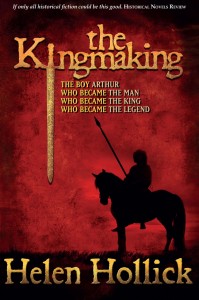 The boy – who became a man, The boy – who became a man,
The man – who became a king,
The king – who became a legend.
Helen’s debut novel, published in 1994, is the first part of her Pendragon’s Banner trilogy about King Arthur. Using early Welsh legends, she ignored the Norman knights in armour, turreted castles and magical elements – there is no Lancelot, Camelot or Merlin. Instead, she explored what might have happened during the 5th century ‘Dark Age’ – the transition from post-Roman Britain to Anglo-Saxon England, when one man, Arthur, tried to accomplish a peaceful union between the Britons and the English.
More from Helen at her website: www.helenhollick.net
Twitter: @HelenHollick https://twitter.com/HelenHollick
Buy this book here: http://viewauthor.at/HelenHollick Kindle ebook £1.99 $2.50
Devolution by Amie McCracken
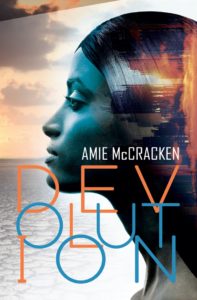 When humans have stopped evolving, when change is stagnant yet the rest of the planet continues to advance and surpass our species, desperation forces humankind to take drastic action. The modified children are born, genetically enhanced to kick-start evolution. When humans have stopped evolving, when change is stagnant yet the rest of the planet continues to advance and surpass our species, desperation forces humankind to take drastic action. The modified children are born, genetically enhanced to kick-start evolution.
Selah is one of the new world children, built to excel. She relishes the challenge of training and exceeds expectations on all testing. But she feels alienated from her peers, her family, and the world. The genetic mutations set her apart, there is something special about her, and she worries she is less her parents’ child and more a science experiment.
T o Be A Queen by Annie Whitehead o Be A Queen by Annie Whitehead
This is the story of Æthelflæd, ‘Lady of the Mercians’, daughter of King Alfred the Great. Married to an older man to seal an alliance, she must overcome personal loss and cast aside preconceptions in order to earn the love of her people. In a world where women have many rights, but do not rule, when her husband falls ill, she must learn to lead an army to save her adopted country from the Viking onslaught and, ultimately, from her own brother.
She will never have the title, but she will learn what it takes to be a queen.
More from Annie at her website: https://anniewhiteheadauthor.co.uk/
Twitter: @AnnieWHistory https://twitter.com/AnnieWHistory
Buy this book here: http://mybook.to/To-Be-A-Queen £1.99/$2.99 (Kindle)
Queen of the Warrior Bees by Jean Gill
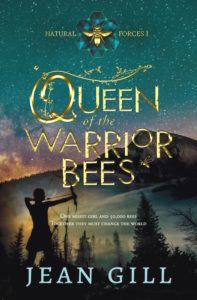 Mielitta is hoping to be accepted for the Maturity Test that will transform her from Citadel misfit into a normal adult but she’s doomed to endless childhood. Then she’s stung by a swarm of bees in the forbidden Forest and gains strange powers. She can shift shape and perspective between human and bee, questioning all the received ideas of Perfect society. Mielitta is hoping to be accepted for the Maturity Test that will transform her from Citadel misfit into a normal adult but she’s doomed to endless childhood. Then she’s stung by a swarm of bees in the forbidden Forest and gains strange powers. She can shift shape and perspective between human and bee, questioning all the received ideas of Perfect society.
She grows into her second nature and adulthood on her own terms, determined to fight for Nature, in all its rich variety, against the might of the Citadel’s male rulers. For humanity’s sake, she must change the Citadel itself.
More from Jean at her website: https://jeangill.com/
Twitter: @writerjeangill https://twitter.com/writerjeangill
Buy this book here: (multiple retailers) https://books2read.com/QueenBee $3.99 / £2.99
The Pearl of Penang by Clare Flynn
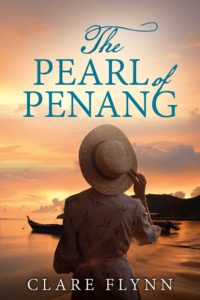 Evie Fraser, a lady’s companion, receives a proposal from a distant relative she met only once. Douglas Barrington is now a widowed rubber planter in exotic Penang. Evie risks all to escape from a life without prospects and cross the world to marry him. Evie Fraser, a lady’s companion, receives a proposal from a distant relative she met only once. Douglas Barrington is now a widowed rubber planter in exotic Penang. Evie risks all to escape from a life without prospects and cross the world to marry him.
The book is all about change – Evie coming to terms with a new life, a new country, a new role, her husband’s quixotic behaviour and about the entire world of pre-war colonial Penang, on the brink of terrible and dramatic change – even though the ex-patriate population refuses to recognise the growing threat of war with Japan.
More from Clare at her website: https://clareflynn.co.uk
Twitter: @clarefly https://twitter.com/clarefly
Buy this book here: (multiple retailers): https://books2read.com/ThePearlOfPenang £3.99/$4.99
Severed Knot by Cryssa Bazos
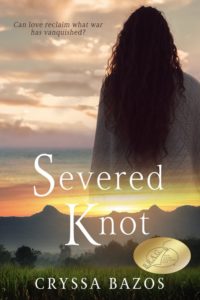 After the English Civil War, Mairead, a young Irish woman, and Iain, a Scottish prisoner of war, are sold into indentured servitude on a Barbados sugar plantation. They form an unexpected and life-changing bond — but can they survive and find a way back home? After the English Civil War, Mairead, a young Irish woman, and Iain, a Scottish prisoner of war, are sold into indentured servitude on a Barbados sugar plantation. They form an unexpected and life-changing bond — but can they survive and find a way back home?
Severed Knot is the second novel in a standalone series that explores a transformed world turned upside down.
Connect with Cryssa on her website: http://cryssabazos.com
Buy this book here (multiple retailers): https://books2read.com/SeveredKnot
Twitter: @CryssaBazos https://twitter.com/CryssaBazos $4.99 / £3.99
Best Murder in Show by Debbie Young
 When Sophie Sayers arrives in the Cotswold village of Wendlebury Barrow to live in the cottage she’s inherited from her great-aunt, her self-esteem is at an all-time low. After years of being taken for granted by her selfish actor boyfriend, touring Europe with Damian Drammaticas, his travelling theatre company, Sophie determines to make the most of the opportunity to start afresh – although turning detective when she discovers a dead body on a village carnival float was not part of her plan. When Sophie Sayers arrives in the Cotswold village of Wendlebury Barrow to live in the cottage she’s inherited from her great-aunt, her self-esteem is at an all-time low. After years of being taken for granted by her selfish actor boyfriend, touring Europe with Damian Drammaticas, his travelling theatre company, Sophie determines to make the most of the opportunity to start afresh – although turning detective when she discovers a dead body on a village carnival float was not part of her plan.
A feel-good, funny novel that will make you want to join the unstoppable Sophie in this captivating village community.
More from Debbie at her website: www.authordebbieyoung.com
Twitter: @DebbieYoungBN http://www.twitter.com/DebbieYoungBN
Buy this book here: http://viewbook.at/best-murder-in-show 99p/99c ebook, £7.99 paperback
A Rip in the Veil by Anna Belfrage
 Three centuries separate them – and yet they meet up. Impossible, says reluctant time traveller Alexandra. Black magic, says 17th Century escaped convict, Matthew Graham, studying this female apparition warily. Will it end in tragedy or romance? Three centuries separate them – and yet they meet up. Impossible, says reluctant time traveller Alexandra. Black magic, says 17th Century escaped convict, Matthew Graham, studying this female apparition warily. Will it end in tragedy or romance?
Whatever the case, life will never be the same again – for either of them!
“An enthralling story, layered in history, romance and with just the right dash of magic that keep a reader turning those pages all night long.” (Coffee Pot Book Club)
More from Anna at her website: www.annabelfrage.com
Twitter: @abelfrageauthor https://twitter.com/abelfrageauthor
Buy this book here: http://myBook.to/ARIV1 £2.99/$2.99
An Unknown Woman by Jane Davis
 Anita knows exactly who she is. She’s proud of the life she’s built with partner Ed. She has her dream job – a curator at Hampton Court Palace. But, then, without warning, everything changes. Anita finds herself standing in the middle of the road, watching her home burn to the ground. Anita knows exactly who she is. She’s proud of the life she’s built with partner Ed. She has her dream job – a curator at Hampton Court Palace. But, then, without warning, everything changes. Anita finds herself standing in the middle of the road, watching her home burn to the ground.
Before she can come to terms with the magnitude of her loss, hairline cracks appear in her perfect relationship. And returning to her childhood home in search of comfort, she stumbles upon the secret her mother has kept hidden, a taboo so unspeakable it can only be written down.
More about Jane at her website: https://jane-davis.co.uk
Twitter: @janedavisauthor https://twitter.com/janedavisauthor
Buy this book here: https://books2read.com/anunknownwoman £3.99/$4.99
The Swooping Magpie by Liza Perrat
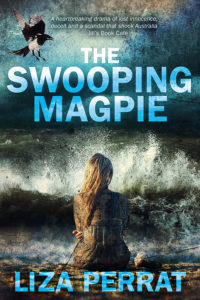 When sixteen-year-old Lindsay is forced into a heart-breaking decision, the resulting trauma will forever transform her. Bullied at home, when sexy school-teacher Jon Halliwell finds her irresistible, Lindsay believes life is about to change. When sixteen-year-old Lindsay is forced into a heart-breaking decision, the resulting trauma will forever transform her. Bullied at home, when sexy school-teacher Jon Halliwell finds her irresistible, Lindsay believes life is about to change.
She’s not wrong.
Lindsay and Jon pursue their affair in secret, until an accident separates the lovers and Lindsay becomes enmeshed in a shocking Australian scandal, discovering the dangerous games of the adult world. Games that destroy lives.
Reflecting the social changes of 1970s Australia, The Swooping Magpie is a heartbreaking drama of lost innocence, deceit and a true-life scandal … Jill’s Book Cafe
More about Liza at her website: http://www.lizaperrat.com/
Twitter: @LizaPerrat https://twitter.com/LizaPerrat
Buy this book here: https://books2read.com/u/bMQdr7 $3.99/£2.99
Britannia’s Spartan by Antoine Vanner
 1882: Japan is modernising rapidly, politically, socially industrially and – most of all – militarily. Imperial China’s weakness and corruption encourage Japan to seize the opportunity to establish itself as the dominant power in the Far East. But first it needs to control Korea, a kingdom frozen in time and reluctant to emerge from centuries of isolation. 1882: Japan is modernising rapidly, politically, socially industrially and – most of all – militarily. Imperial China’s weakness and corruption encourage Japan to seize the opportunity to establish itself as the dominant power in the Far East. But first it needs to control Korea, a kingdom frozen in time and reluctant to emerge from centuries of isolation.
Korea’s king is weak and pliable and only its shrewd and ruthless queen is prepared to make a stand against Japanese aggression. Faced with a nightmare of riot, treachery and battle, can her only sure ally be a Royal Navy captain, in Korea only by accident?
More from Antoine at his website: www.dawlishchronicles.com
Twitter: @antpoinevanner https://twitter.com/AntoineVanner
Buy this book here: https://amzn.to/38sxyOZ $3.99/£2.99
INCEPTIO by Alison Morton
 New Yorker Karen Brown is caught in a tangle of hot foreign agents, a vicious enforcer hunting her and tough families. Running for her life, she flees to her dead mother’s homeland – Roma Nova – the last Roman Empire outpost in present day Europe. New Yorker Karen Brown is caught in a tangle of hot foreign agents, a vicious enforcer hunting her and tough families. Running for her life, she flees to her dead mother’s homeland – Roma Nova – the last Roman Empire outpost in present day Europe.
But the killer reaches into her new home. Unable to rely on anybody else, especially arrogant special forces officer Conrad Tellus, she undergoes intensive training, develops fighting skills and becomes an undercover cop. Crazy with bitterness at his past failures, the killer sets a trap for Karen. And she has no choice but to spring it.
More from Alison (and Roma Nova) at her website: https://alison-morton.com
Twitter: @alison_morton https://twitter.com/alison_morton
Buy this book here: INCEPTIO buying links £2.99/$3.99/3.49€

Alison Morton is the author of Roma Nova thrillers – INCEPTIO, PERFIDITAS, SUCCESSIO, AURELIA, INSURRECTIO and RETALIO. CARINA, a novella, and ROMA NOVA EXTRA, a collection of short stories, are now available. Audiobooks are available for four of the series. NEXUS, an Aurelia Mitela novella, is now out.
Find out more about Roma Nova, its origins, stories and heroines… Download ‘Welcome to Roma Nova’, a FREE eBook, as a thank you gift when you sign up to Alison’s monthly email newsletter. You’ll also be first to know about Roma Nova news and book progress before everybody else, and take part in giveaways.
If you enjoyed this post, do share it with your friends!Like this:Like Loading...
 Some authors don’t like second-hand book stalls, whether run as a businesses or for a charity fête. In fact, they hate them. The author gets no royalty nor secondary right nor anything. The books are toted around, exchanged or traded like a lump of former tree for a pound/euro/dollar or two – virtually free. I heard one author say it was verging on piracy. A bit strong in my opinion, but I respect his right to say it. Some authors don’t like second-hand book stalls, whether run as a businesses or for a charity fête. In fact, they hate them. The author gets no royalty nor secondary right nor anything. The books are toted around, exchanged or traded like a lump of former tree for a pound/euro/dollar or two – virtually free. I heard one author say it was verging on piracy. A bit strong in my opinion, but I respect his right to say it.
However, consider this…
If you live in a non-English speaking country as I do in France, you can’t always find books in English. Sometimes, local media stores have a small display of international best sellers, lost amongst the local language acres of shelves of not only books but games, music, DVDs and small technology. My local library has no books, let alone fiction, in English except easy readers for school age children. Of course, there’s always Amazon… (Other online retailers are available, as they say.) But there’s nothing like handling ‘real’ books, your fingers wandering among hundreds of titles by authors you’ve never heard of as well as ones by familiar authors.
Second-hand bookstalls and book exchanges, plus the pop-up summer and Christmas fairs, are an opportunity to discover new reads, new authors and to talk about books to the person running them. Usually, they’re avid readers which is why they got into selling books in the first place.
That’s the cultural argument.
Of course, I would LOVE you to buy my books first-hand and give me a little direct remuneration – I share a few thoughts on author income here.
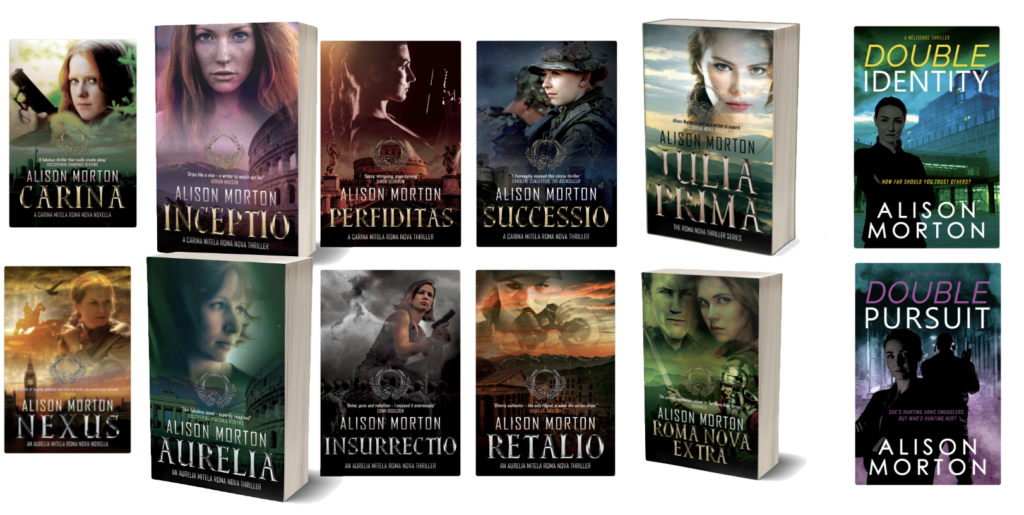
But there’s a parallel argument to consider. It could be that having discovered a new-to-you author in a tattered copy picked up second-hand or perhaps lent to you by a friend, you are entranced by the writing, the story and the new world the author’s words have drawn you into. You thirst for more. You are desperate to read more.
Chances are the bookstall/second-hand shop doesn’t have any more by that author. Possibly you won’t see that temporary stall until the same time next year – a whole 12 months away. Horrors!
You clutch your new treasure to your chest and dive on to the Internet and, notwithstanding the postage, order two or three more by the same author. I did exactly this after buying one book for 50 cents in a barn sale and promptly spent another £35.00 on Amazon on the rest of the series. I had discovered Vatta’s War and Elizabeth Moon netted another four full book sales.
So perhaps the second-hand bookstall or book exchange, its wares sprawled in boxes on a trestle-table once a month, aren’t demons from hell, but a spur to buying by keen readers.
Updated 2023: Alison Morton is the author of Roma Nova thrillers – INCEPTIO, CARINA (novella), PERFIDITAS, SUCCESSIO, AURELIA, NEXUS (novella), INSURRECTIO and RETALIO, and ROMA NOVA EXTRA, a collection of short stories. Audiobooks are available for four of the series.Double Identity, a contemporary conspiracy, starts a new series of thrillers. JULIA PRIMA, a new Roma Nova story set in the late 4th century, is now out.
Find out more about Roma Nova, its origins, stories and heroines and taste world the latest contemporary thriller Double Identity… Download ‘Welcome to Alison Morton’s Thriller Worlds’, a FREE eBook, as a thank you gift when you sign up to Alison’s monthly email update. You’ll also be among the first to know about news and book progress before everybody else, and take part in giveaways.
If you enjoyed this post, do share it with your friends!Like this:Like Loading...
|
Subscribe to Blog via Email
Join 368 other subscribers.
Categories
Archive
|
 I haven’t posted about Covid19 epidemic before – I leave the medical stuff to the experts. As an ordinary person, a ‘civilian’, I can see it’s an unknown killer that can sneak up on you for up to 14 days before it shows itself and against which we have no known cure. Effects vary from light flu-like symptoms to death. This makes it massively unpredictable and is ant the root of most anxiety.
I haven’t posted about Covid19 epidemic before – I leave the medical stuff to the experts. As an ordinary person, a ‘civilian’, I can see it’s an unknown killer that can sneak up on you for up to 14 days before it shows itself and against which we have no known cure. Effects vary from light flu-like symptoms to death. This makes it massively unpredictable and is ant the root of most anxiety. Like everywhere else, there is a shortage of protective materials and gel, the health workers are working their socks off, retired medical and nursing staff have been recalled and the scientists are working flat out on remedies, tests and vaccinations.
Like everywhere else, there is a shortage of protective materials and gel, the health workers are working their socks off, retired medical and nursing staff have been recalled and the scientists are working flat out on remedies, tests and vaccinations.





































